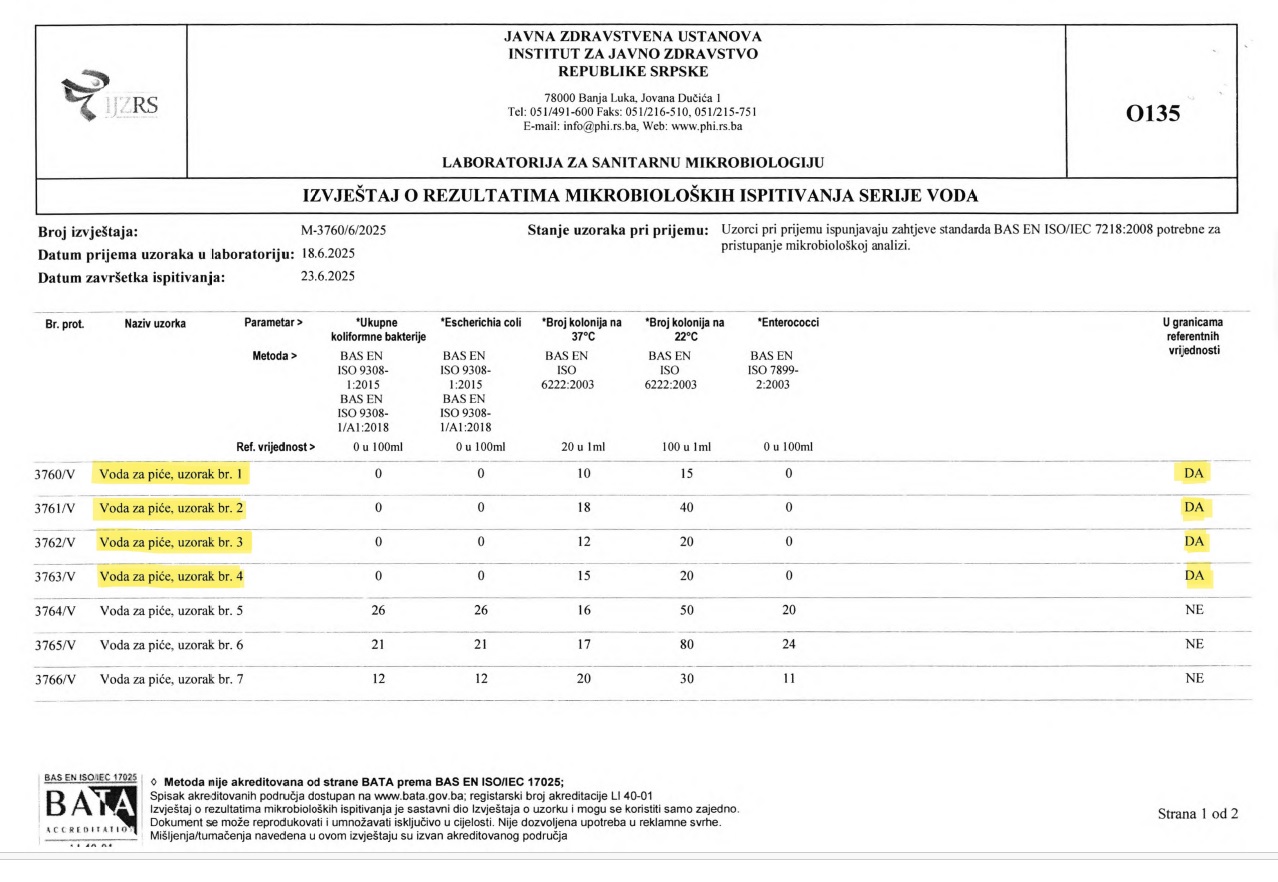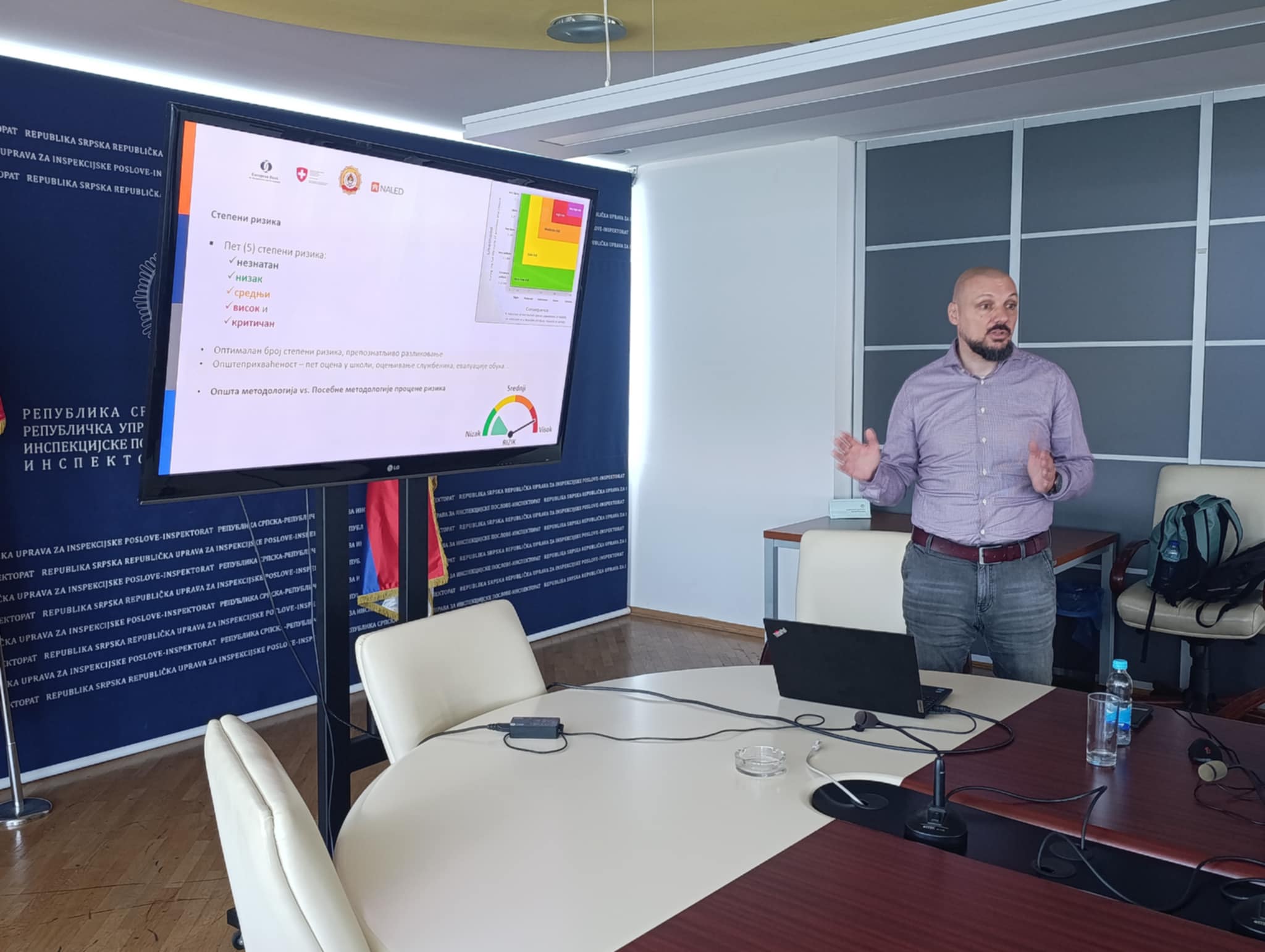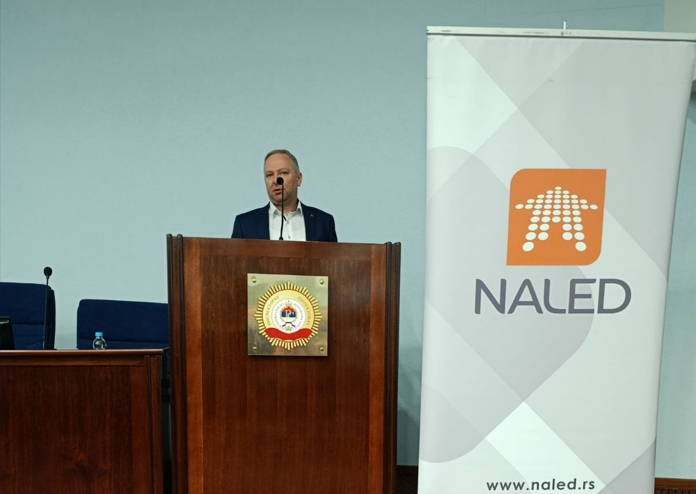On 28 February, 2024 the Law on Prevention of Money Laundering and Financing of Terrorist Activities (“Bosnia and Herzegovina Official Gazette”, 12/24) came into force. One of the control authorities in charge of enforcing this Law is also the Republic Administration for Inspection Affairs.
Bearing in mind the fact that this authority inspects the non-financial sector, specifically businesses listed in Article 93 of the Law, in relation to Article 5 of the same Law, we are taking this opportunity to announce direct inspection surveillance in the coming time period.
The Law in question lists detailed obligations of business to implement the law, and the legal concept is based on appropriate risk assessment and management.
Busnisess from Article 5 of this Law are obliged to take measures, actions and steps to prevent and uncover money laundering and financing of terrorist activities and financing of weapons of mass destruction before, during and after conducting transactions or establishing and maintaining business relationships.
Measures, actions and steps from this Article include:
a) conducting risk assessment on money laundering and financing terrorist activities;
b) establishing policies, procedures, controls and steps;
c) monitoring implementation of policies, controls and procedures from item b) of this paragraph and improving them as necessary;
d) taking increased risk management measures and risk mitigation where a high level of risk is identified;
e) taking streamlined risk management measures and removing risk where a low level of risk is identified;
f) identifying and monitoring clients in a manner and under conditions determenied with this Law;
g) delivering information, data and documentation to the Financial Intelligence Department of the State Investigation and Protection Agency (SIPA) on transactions, assets and persons (hereinafter: FID);
h) naming an authorised person and a deputy to perform obligations from this Law on behalf of the business, and provde conditions for their work;
i) regular expert education, training and improving skills of the employees;
j) providing for regular internal control and internal and external audits of their obligations from this Law;
k) developing and regular updating of a list of identificators of suspicious transactions, clients or parties;
l) record keeping and saving and protecting data;
m) performing other measures and actions based on this Law and bylaws produced on the basis of this law.
The business from Article 5 of this Law is obliged to develop adequate policies and procedures by which it will, in order to efficiently manage risk from money laundering and financing of terrorista activities and financing the proliferation of weapons of mass drestruction, include measures defined in this Article (Article 9 of the Law). The policies and procedures must be proportional to the nature and size of the business and must be approved by the business’ highest monitoring, management and governance authority in accordance with the statutes. Detailed provisions on establishing policies, procedures and control activities are contained in Article 56 of the Law.
A provision of Article 10 prescribed the obligation of assessing the risk from money laundering and financing of terrorist activities and financing of the proliferation of weapons of mass destruction in order to identify, assess, understand and decrease the risk from money laundering and financing of terrorist activities and financing of the proliferation of weapons of mass destruction, bearing in mind risk factors that refer to:
a) clients;
b) states or geographic areas;
c) products, services or transactions;
d) distribution channels.
The risk assessment must be documented and proportional to the size of the business, type, scope and complexity of its operation, and the business is obliged to update the risk assessment documentation at least once a year and deliver it to the competent authority from Article 93 of this Law (in specific case the Republic Administration for Inspection Affairs).
The next obligation relates to naming an aurhorised person and one or more deputies of the authorised person, in order to deliver information to the FID. The authorised person is obliged to be present during direct surveillance, have direct communication with representatives of law enforcement authorities and provide them with all necessary assistance for unhindered direct surveillance. Requirements for authorised persons and their deputies are prescribed in provisions of Articles 48-51, 53 and 54 of the Law.
Provisions of Articles 57 and 58 of the Law prescribes obligations to compile a list of indicators for recognizing suspicious transactions, i.e. assets and clients for which there is reasonable doubt that they conduct money laundering and financing of terrorist activities and financing of the proliferation of weapons of mass destruction, and the business update the list based on available information on new trends and money laundering and terrorist financing typologies. In case of changed circumstances in the operation of the business, if they are important for the implementation of this law, the business is obliged to update the list of indicators. The business is obliged to deliver the list of indicators and addendum to the list to the FID and the surveillance authority within 30 days upon compiling it. Provisions of Article 58 of the Law prescribes the obligation to define the procedure of independent and anonymous report on violations on provisions of the Law and its bylaws within the business.
An important obligation is also establishing and keeping records, types of records and their content, which is prescribed in Articles 59-61 of the Law.
The business defined in Article 5 of this Law is obliged to provide for actions and measures for preventing and discovering money laundering and financing of terrorist activities to be implemented at the same level in its branch offices and subsidiary firms in its majority ownership, regardless of that fact that its place of business is B&H or a foreign country, which is detailed in provisions of Article 52 of the Law. Also, the business from Article 5 of this Law is obliged to, within its regular activities on efficient management of risk from money laundering and financing of terrorist activities and financing of the proliferation of weapons of mass destruction, establish internal control of operations aimed at preventing and discovering money laundering and financing of terrorist activities and financing of the proliferation of weapons of mass destruction adequate to the size and nature of the business. Therefore, at least once a year, to provide independent internal and external audit of adequacy, reliability and efficiency of the system managing the risk from money laundering and financing of terrorist activities and financing of the proliferation of weapons of mass destruction, which can be an integral part of prescribed external audit, when the business or the surveillance authority assesses that, bearing in mind the size and nature of business, it is necessary to have an independent internal or external audit from this Paragraph, and it is mandatory when the law or bylaws which regulate the business operations prescribe an obligation of conducting an internal or external audit (Article 55 of the Law).
Businesses from Article 5 of this Law are obliged to provide adequate physical, organisational and technical measures and procedures from safekeeping of data and documentation that they deliver to FID, or to receive it from the FID and use it to protect them from loss or destruction, or unauthorised access, unauthorized changes, unauthorised publication, access by an unauthorised person and any other misuse. In order to implement the above, the business is obliged to produce adequate internal documents and procedures that must be approved by the highest management of the business and which will, proportional to the nature and size of the business, defined adequate physical, organisational and technical measures and procedures for safekeeping of data and documentation (Article 89 of the Law).
We would strongly like you to pay attention to provisions of Article 41 of the Law which prescribes a ban on receiving cash if the payment for goods or services exceeds the amount of BAM 30,000. The cash limit is also implemented when the payment is made in several connected cash transactions and their total value exceeds BAM 30,000. Persons conducting sales of goods, real estate or performing services must receive payment from the buyer to their transaction account. Cases of receiving and approving loans is treated in the same way. When a contract of sale for real estate includes a transaction or transactions, i.e. assets in the value of 30,000 or more, or an equivalent value in foreign currency, each transaction must be conducted through a banking payment order or bank transfer, unless differently prescribed by another law. Businesses and entrepreneurs registered for performing trading sailing vessels, vehicles and aircraft must not take cash from a client or third person if the amount exceeds BAM 30,000.
Finally, the Law prescribes fines for violations which range from 5,000 to 20,000 BAM, from 20,000 to 80,000 BAM, and from 50,000 to 200,000 BAM for businesses depending on the type violation, while the fines for responsible person range from 1,000 to 5,000 BAM, from 3,000 to 10,000 BAM, and from 5,000 to 20,000 BAM, depending on the type of violation. There are also fines ranging from 2,000 to 10,000 BAM for natural persons perfuming independent business operations for failing to adhere provisions of this Law.
Bearing in mind what sort of risk from money laundering and financing terrorist activities comes from the real estate trade sector, here you can find a link with Guide for real estate traders with measures to prevent money laundering and financing terrorist activities.
Also, you can here find links with information containing a list of obligations for traders in real estate, motor vehicles, precious metal and jewels, accountants, auditors and tax advisors. The presentation of activities of the activities of the Republic Administration for Inspection Affairs in enforcing the Law on preventing money laundering and financing terrorist activities contains the list of obligations for businesses, and that is why the all addressees that the Law applies to take active participation in implementation of legal provisions, so that we could establish an adequate system of risk assessment and management in the area of prevention of money laundering and financing terrorist activities.










